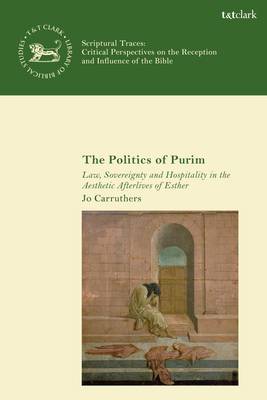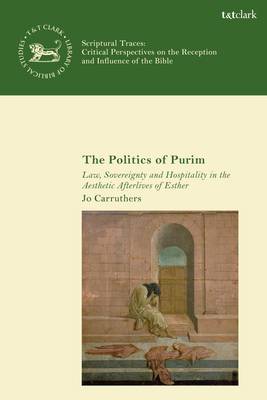
Je cadeautjes zeker op tijd in huis hebben voor de feestdagen? Kom langs in onze winkels en vind het perfecte geschenk!
- Afhalen na 1 uur in een winkel met voorraad
- Gratis thuislevering in België vanaf € 30
- Ruim aanbod met 7 miljoen producten
Je cadeautjes zeker op tijd in huis hebben voor de feestdagen? Kom langs in onze winkels en vind het perfecte geschenk!
- Afhalen na 1 uur in een winkel met voorraad
- Gratis thuislevering in België vanaf € 30
- Ruim aanbod met 7 miljoen producten
Zoeken
The Politics of PurimLaw, Sovereignty and Hospitality in the Aesthetic Afterlives of Esther
Law, Sovereignty and Hospitality in the Aesthetic Afterlives of Esther
Jo Carruthers
€ 228,95
+ 457 punten
Omschrijving
This book approaches the holiday of Purim as profane, freed to human use and ends, in order to consider the political legacy of the biblical story of Esther in festival and art works. Jo Carruthers explores carnival and synagogue practices, the purimshpiln(Purim's own dramatic genre), illuminated Esther scrolls, as well as artworks by Botticelli, Millais and Jan Steen. The complex and astute interrogation of political life in such festival and artworks is analysed through theories of sovereignty, law, precarity and hospitality by key political thinkers such as Giorgio Agamben, Hannah Arendt, Walter Benjamin, Judith Butler, Jacques Derrida, and Jacques Rancière.
Carruthers considers different motifs of boundary conservation and dissolution, as a means of contemplating the political implications of Purim and the Esther story for diaspora politics. How is sovereignty aspired to and attained by marginalized and threatened communities? How can one respond to the ethical call of hospitality to relax sovereign boundaries whilst protecting and celebrating that which is exceptional? The practice of giving gifts, mishloach manos, offers a model of hospitality that together with Purim's profane impulse is epitomized in the final chapter's discussion of a 2018 Brooklyn purimshpil, that offers a riotous ridiculing of white supremacist rhetoric, norms of domination, capitalist inequalities, modern slavery and ablest identities and assumptions.
Carruthers considers different motifs of boundary conservation and dissolution, as a means of contemplating the political implications of Purim and the Esther story for diaspora politics. How is sovereignty aspired to and attained by marginalized and threatened communities? How can one respond to the ethical call of hospitality to relax sovereign boundaries whilst protecting and celebrating that which is exceptional? The practice of giving gifts, mishloach manos, offers a model of hospitality that together with Purim's profane impulse is epitomized in the final chapter's discussion of a 2018 Brooklyn purimshpil, that offers a riotous ridiculing of white supremacist rhetoric, norms of domination, capitalist inequalities, modern slavery and ablest identities and assumptions.
Specificaties
Betrokkenen
- Auteur(s):
- Uitgeverij:
Inhoud
- Aantal bladzijden:
- 224
- Taal:
- Engels
- Reeks:
Eigenschappen
- Productcode (EAN):
- 9780567691866
- Verschijningsdatum:
- 6/02/2020
- Uitvoering:
- Hardcover
- Formaat:
- Genaaid
- Afmetingen:
- 163 mm x 236 mm
- Gewicht:
- 521 g

Alleen bij Standaard Boekhandel
+ 457 punten op je klantenkaart van Standaard Boekhandel
Beoordelingen
We publiceren alleen reviews die voldoen aan de voorwaarden voor reviews. Bekijk onze voorwaarden voor reviews.









